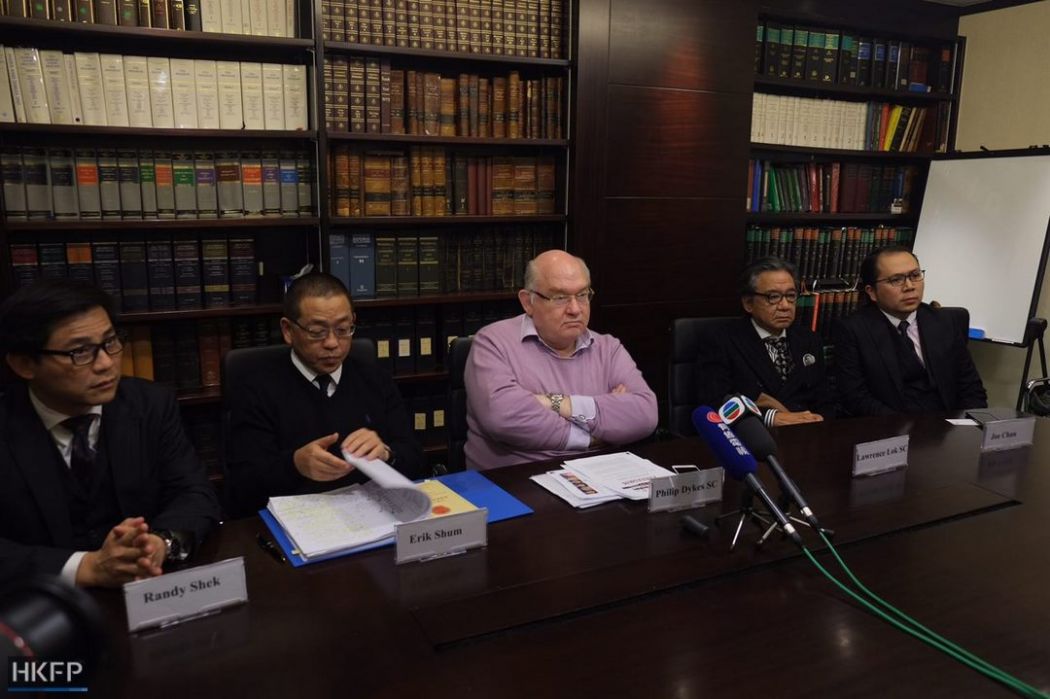The head of Hong Kong’s professional body of lawyers has vowed to continue engaging with their mainland Chinese counterparts, despite warning signs that such efforts may not be entirely welcome.
Chairman of the city’s Bar Association Philip Dykes said that he hopes to raise the city’s legal profile internationally, as well as foster “better understanding” between local and mainland lawyers.
“We are not trying to proselytise,” he told HKFP in an interview. “We are two completely different systems… We are just trying to understand what the differences are, so as to better understand one another.”

Dykes is set to steer the organisation for another year after being elected last January over incumbent Paul Lam.
Compared with last year’s heated race, Dykes’ transition into his second term as chairman appears much calmer. No challenger for his office is expected at the Association’s annual election on Thursday.
However, questions remain about whether the body – which some say has grown more critical of the government under Dykes’s leadership – has soured its relationship with Beijing.
Dykes had previously said he had no problem getting along with China. That statement may soon be put to the test: by tradition, Hong Kong’s barristers are invited to visit Beijing every year, or every other year.
No such invitation was extended in 2018, and it remains to be seen if either side will make overtures.
‘Not conducive to confidence’
Over the past year, the Bar Association has issued statements against the joint checkpoint at the high-speed rail terminus, screening of election candidates, personal attacks against judges, the expulsion of Victor Mallet, and the Chinese government’s treatment of human rights lawyer Wang Quanzhang.

“The Bar Association will not be silent on a major issue just for fear that it antagonises someone,” Dykes said.
The pro-democracy camp has continued to criticise China’s influence on Hong Kong’s legal system, saying that it threatens judicial independence and the rule of law.
Dykes, too, once described the power of China’s top legislature to interpret the Basic Law as the “greatest threat to the rule of law in Hong Kong.”
In December, a local court went one step further and followed a “decision” made by China’s top lawmaking body concerning the joint checkpoint arrangement. Unlike “interpretations”, “decisions” have no clear legal status in Hong Kong.
“For One Country Two Systems to work, interpretations should be few and far between,” Dykes said. “Making statements that are like interpretations is not conducive to confidence in the system.”
Tensions between Hong Kong and Beijing lawyers came to a head in August, after Peking University stopped two barristers from teaching a course on common law. Dykes was also disinvited from the course’s graduation ceremony in Beijing.

The Bar Association – which was responsible for organising the course – said it had received no explanation and decided not to offer the course at Peking University this year. “That’s not the way to deal with the Hong Kong Bar,” Dykes said.
“The Bar has invested quite a bit of money in this, and members invested a lot of time, and it is highly unsatisfactory – to put it at its mildest – that people are turned away with no explanation,” he added. “So you can’t say, we’ll do it again next year, have another two people turned away.”
Nevertheless, Dykes said that the mainland Chinese lawyers he met had been friendly on an individual level, citing two trips to Guangzhou.
If the barristers were invited to visit Beijing, Dykes said they would go.
Bridging internal divides
Dykes made headlines last January after forming the “Philip Dykes’ list” – a team of barristers who ran against incumbent Bar Council members. Bar Council elections are usually uncontested, and incumbent chairpersons are expected to be in office for two years.
After Dykes beat Lam in a surprise victory, both winner and loser have said that Hong Kong’s barristers must remain united.

In retrospect, Dykes pointed out that the Bar Council had stood together on a number of issues concerning their profession.
The Bar Council agreed to introduce a monthly honorarium of HK$6,000 for all pupil barristers, who were previously unpaid.
“To my surprise, [the proposal] passed without too much problem,” Dykes said. “I said ‘to my surprise,’ because I see some people might regard this as being a step too far.”
Dykes said that this would move towards levelling the playing field and attracting new talent to the profession.
As for his second term, Dykes did not specify any short-term goals, but said he would push for compulsory further legal education for barristers.
Another goal is to raise Hong Kong’s legal profile overseas, as Dykes said he had met foreign lawyers who couldn’t tell Hong Kong apart from China.
Common law values
Dykes had spoken out on many occasions about the broader picture of Hong Kong’s rule of law. However, he said he also wanted the public to pay more attention to the “smaller” aspects of the legal system.

Recent political court cases – which often involve high-profile public figures and polarising events – have distorted the public’s perception of the legal profession, he said.
“It’s really rather depressing to be an advocate and be labelled – you are a yellow ribbon, therefore you can’t be trusted to bring an objective view,” Dykes said.
“People are ‘yellow ribbons’ or ‘blue ribbons’, and worse than that, the legal teams are labelled as such,” Dykes said. “It’s skewed by attributed political motives which are derived from our clients.”
It is for the same reason that Dykes strongly condemned personal attacks against judges, some of whom may have made unpopular rulings.
The path forward should be a recognition of common law values, including the independence of the legal profession, he said.
“I’d like to see more confidence in the legal system, in the fundamental value of the common law system. Perhaps taking the spotlight off the Basic Law and the ‘big fights’.”
